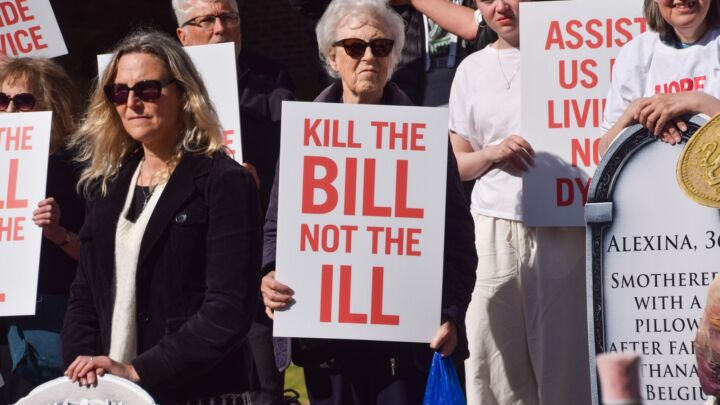Why do so many kids now have special educational needs?
This isn’t a mental-health crisis, it’s an overdiagnosis crisis.

Want unlimited, ad-free access? Become a spiked supporter.
‘If they thought taking money away from disabled adults was hard’, one anonymous UK Labour MP told the Independent last week, ‘watch what happens when they try the same with disabled kids’. Emboldened by their defeat of the government’s cost-cutting welfare reforms earlier this month, Labour backbenchers are now gearing up to take on education secretary Bridget Phillipson. She is said to be looking at cutting the special educational needs and disabilities (SEND) budget.
According to reports, the UK government is focussing on reforming or even scrapping so-called educational, health and care plans (EHCPs). Introduced in 2014, EHCPs impose a legal obligation on local councils to fund eligible children’s placement at certain schools, the provision of permanent teaching assistants and even pupils’ transport – including the use of taxis – to and from school. So far, Phillipson has refused to rule out abolishing EHCPs ahead of final proposals due to be revealed in October.
Unsurprisingly, local councils are struggling to meet the daunting costs imposed on them by the current SEND and especially EHCP arrangements. Some may even face bankruptcy. As it stands, 15 councils are predicted to have overall SEND deficits in excess of £100million by March next year. Hampshire County Council is predicted to have a deficit greater than £300million.
A large proportion of the deficit is down to councils being obliged to pay for pupils’ transport to and from schools under the EHCP system. Take Kent County Council, which has a SEND deficit of £97million. Last year, it spent £70million on taxis for special-needs students alone. Local councils have been able to conceal these debts through what is called ‘statutory override’ – an accounting sleight of hand allowing local councils to deviate from standard accounting practices to address specific financial challenges. As Tim Oliver, chair of the County Councils Network, has pointed out, the end of the override – recently pushed back to 2028 – could leave ‘half of England’s county and unitary councils insolvent overnight’.
The financial challenges currently facing councils are immense. But there is a deeper problem here – namely, the huge increase in recent years in the number of school students now claiming special-educational-needs support. According to the latest figures, more than 1.6million school pupils in England have some form of special educational need. That’s 18 per cent, or one in five, of all English youngsters requiring some extra help or support. This is nearly a third more children needing special educational support since 2016.
The increase in pupils requiring EHCPs is even more shocking. The number of students in possession of these plans is now well over 600,000 – an increase of more than 140 per cent in less than a decade. This steep rise in EHCPs, complete with individual transport costs, has added roughly £12 billion to the bottom line of councils across England and Wales.
All of which brings us to the heart of the matter. Why are so many more children being classified as having special educational needs? And why are so many more now in need of EHCPs? The principal reason, it seems, is the massive increase in the diagnosis of mental-health conditions and disorders. More than 70,000 of those claiming EHCPs are doing so because of ‘social, emotional and mental health’. And nearly 150,000 are now claiming EHCPs because they have been diagnosed with autism. Autism can be an incredibly serious, incapacitating condition. But over the past decade or so, the definition of autism has become so broad that it can seem as if every other socially awkward young person has been put somewhere ‘on the spectrum’. Indeed, autism diagnoses increased by 787 per cent in the UK between 2000 and 2018. It is telling that just four per cent of EHCP recipients are classified as having a ‘severe disability’.
This classification of so many more young people as having special educational needs on the basis of mental-health diagnoses is not doing them any favours. It may allow hundreds of thousands of kids to get special dispensation in the classroom, or to be ferried to schools of their parents’ choosing. But they are effectively being told, or being allowed to believe, that they require special state support – that, in short, they are not as capable as other pupils are. By treating them in this way, their own social and intellectual development is being arrested.
They are certainly being set up for a rude shock when they enter the workforce, if indeed they ever do. Sadly, many will transition seamlessly from EHCPs to some form of incapacity benefit, and spend what could have been an independent, productive life as, in effect, wards of the state.
More tragic is the effect of this drained, overrun system on children and the families who do need help from the state. As disability is one of the strongest predictors of poverty in the UK, it should surely be the objective of welfare policy to ensure money flows to the people who really do need it. Yet the expansion of SEND provision and EHCPs, by spreading resources so thinly, has made life worse for the very people the system should be protecting and supporting.
If Phillipson is serious about reforming the SEND system, which requires dramatically tightening up on the EHCP provision, a backbench revolt appears all but certain. When it does, we must all hope it’s one the government has the cojones to face down. Because it isn’t just the economy, but the future of swathes of young people, that the current system is undermining.
Hugo Timms is an editorial assistant at spiked.
Correction: an earlier version of this article stated that the SEND statutory override will end in March. This was recently extended by two years, meaning the override will now end in 2028.
£1 a month for 3 months
You’ve hit your monthly free article limit.
Support spiked and get unlimited access.
Support spiked – £1 a month for 3 months
spiked is funded by readers like you. Only 0.1% of regular readers currently support us. If just 1% did, we could grow our team and step up the fight for free speech and democracy.
Become a spiked supporter and enjoy unlimited, ad-free access, bonus content and exclusive events – while helping to keep independent journalism alive.
———————————————————————————————————————————–
Exclusive January offer: join today for £1 a month for 3 months. Then £5 a month, cancel anytime.
———————————————————————————————————————————–
Monthly support makes the biggest difference. Thank you.










Comments
Want to join the conversation?
Only spiked supporters and patrons, who donate regularly to us, can comment on our articles.